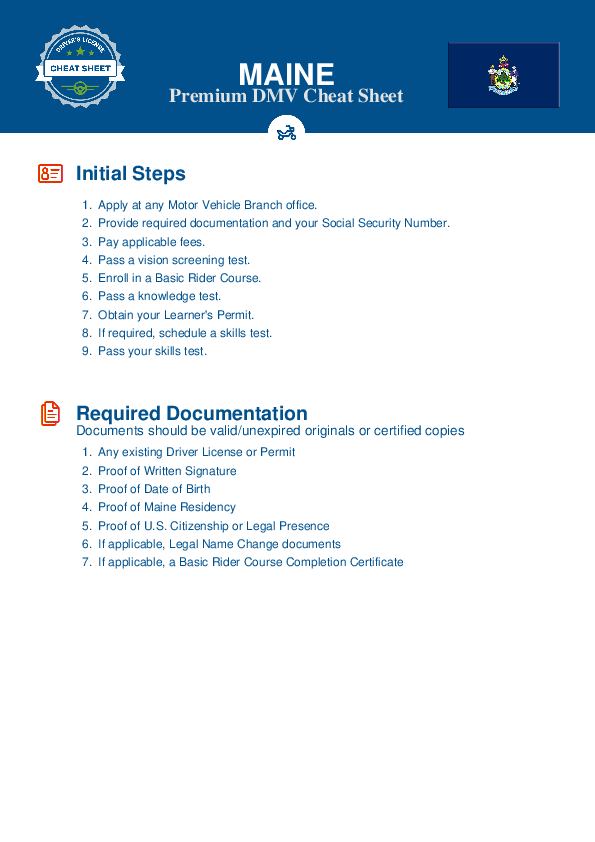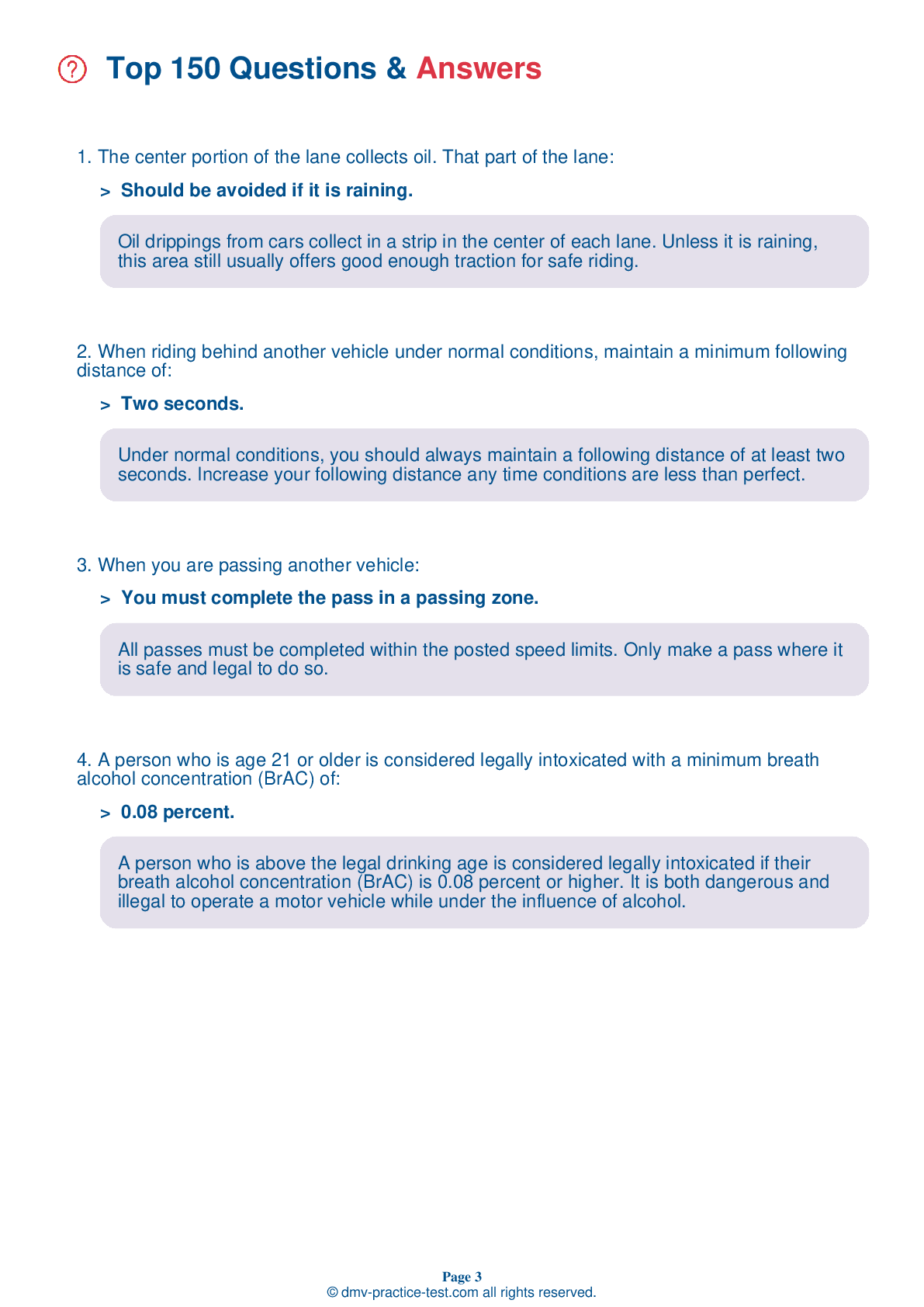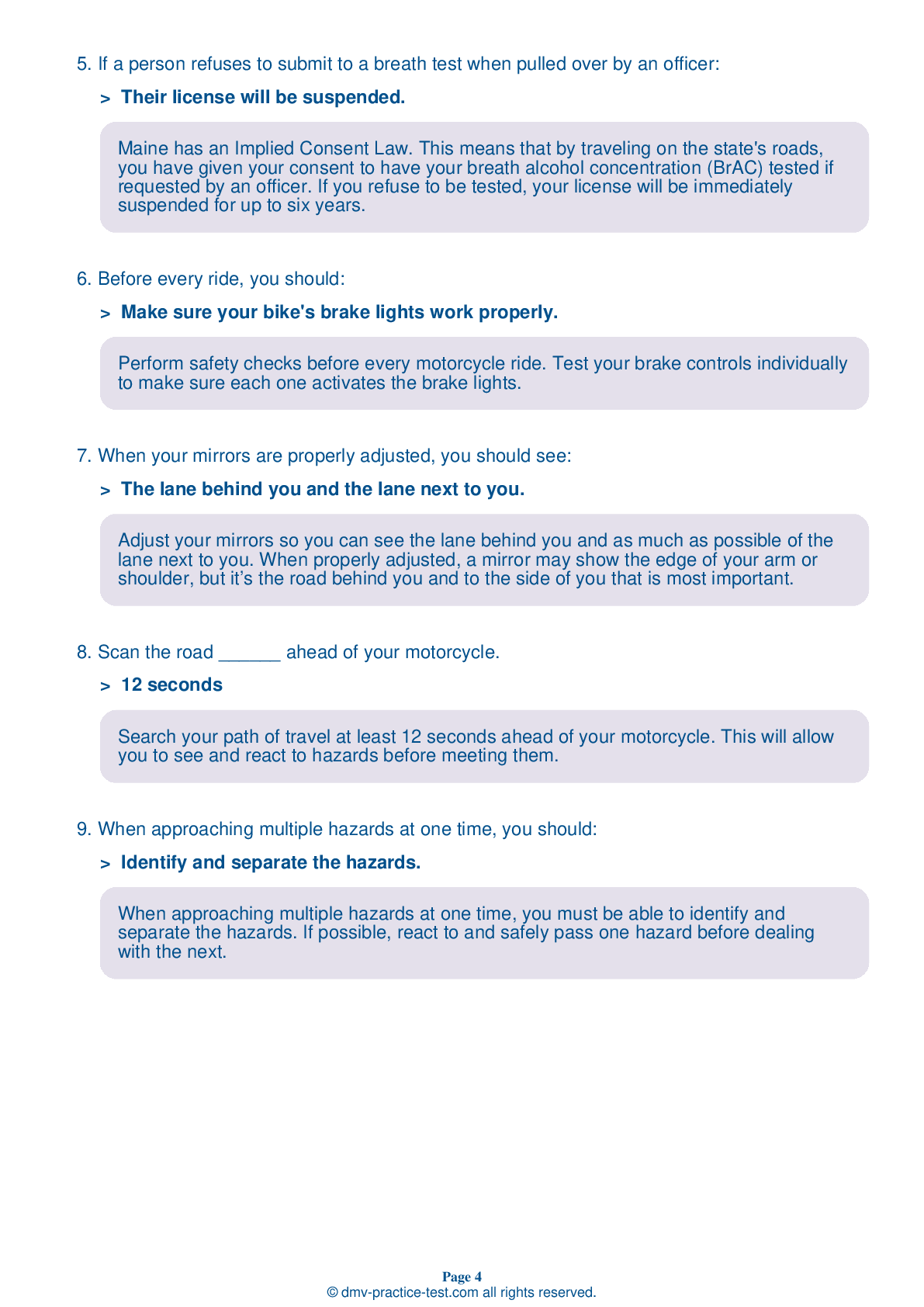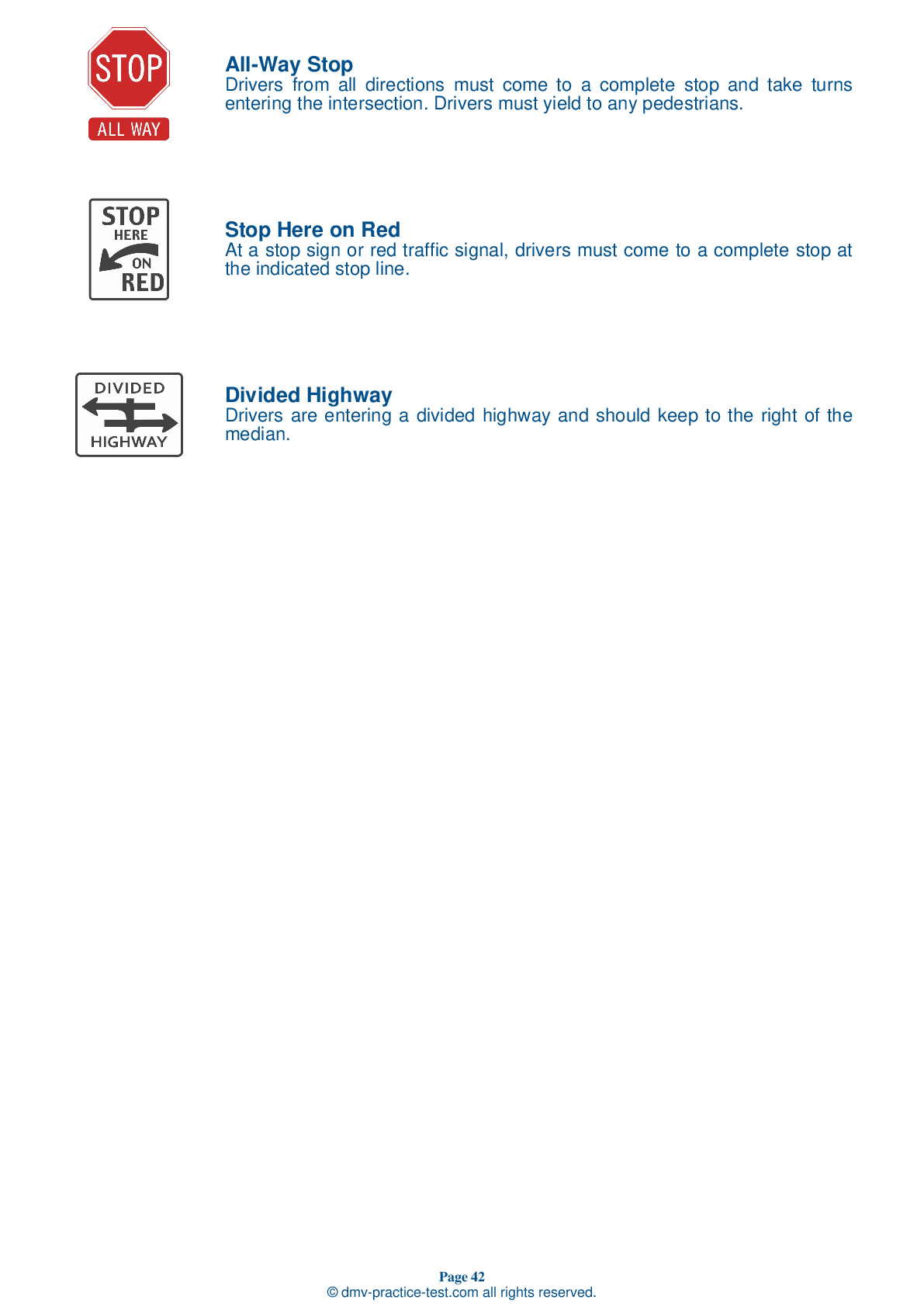DMV Permit Test #6
Motorcycle Test | License ME 2026 | FREE Online Practice! #6
Take this FREE motorcycle test (license in ME 2026) to check your knowledge of the road rules. To improve your results, download a motorcycle handbook online, study theory, and practice for free on our website. Still worried about how to get a motorcycle license in Maine in 2026? Check our website for more sample tests, train as much as possible, and boost your grades!
50
40
16
1 . When riding in traffic, it is important to remember that motorcycles:
Have only one blind spot.
Like any other vehicle, motorcycles have blind spots. Always turn your head to check for traffic in your blind spot before changing lanes.
2 . A motorcyclist is well-protected if they are wearing:
Shoes that stop below their ankle.
For your protection while riding, it is best to wear a jacket and pants that cover your arms and legs completely. Boots or shoes should be tall and sturdy enough to cover and support your ankles. Footwear should have low heels that will not catch on the foot pegs or rough road surfaces. Gloves made of leather or another durable material will help protect your hands in the event of a crash while providing you with an improved grip on the controls.
3 . On a slippery surface, you should not:
Use both brakes when slowing or stopping.
To ride safely on a slippery surface, you should use both brakes when slowing or stopping, reduce your speed, and avoid making sudden moves. Be alert to oily areas, dirt, gravel, shaded areas, and bridges, as these surfaces are more likely to be slippery than others.
4 . This sign means:
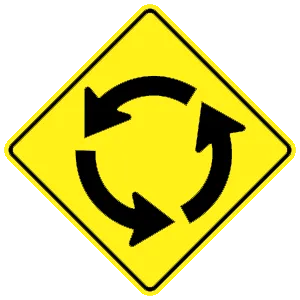
Curve ahead.
This sign indicates that a roundabout is ahead. Enter a roundabout at a low speed and yield to existing traffic.
5 . Who must wear a helmet while riding a motorcycle?
All of the above.
In Maine, all motorcycle operators and passengers under the age of 18 are required to wear helmets while riding. Operators of any age who have held their license for less than one year, or who are riding with a learner's permit, are also required to wear a helmet while riding. If an operator is required to wear a helmet, any passenger they are transporting is also required to wear a helmet, regardless of the age of the passenger.
6 . It is difficult for other motorists to see motorcycles at night. To make up for that, a motorcycle rider should:
Stay directly in front of another vehicle to be seen in their headlights when riding at night.
Strategies for safely riding at night include reducing your speed, increasing your following distance, using the lights of the car ahead to help see farther down the road, using your high beam headlight (unless following or meeting another vehicle), and being flexible about your lane position.
7 . When riding, you should:
Turn just your head and eyes to look where you are going.
When turning, look through the turn to where you want to go by turning only your head. Keep your knees against the gas tank to help maintain your balance while turning. Your arms should be slightly bent any time you are holding the handgrips.
2026 Maine | Frequently Asked Questions
To acquire a motorcycle driver's license in Maine, you must first obtain a motorcycle learner's permit. This involves passing a written test. After practicing with the permit for at least 60 days, you can take the road test to get your motorcycle license. You must also complete an approved motorcycle rider education course.
In Maine, the minimum age for obtaining a motorcycle permit is 16 years old. This permit allows for supervised practice. To receive a motorcycle endorsement or license, the applicant must pass a written test and a road test. However, if the applicant is under 18, they must also complete an approved motorcycle rider education course.
Yes, you do need a dedicated license for motorcycle riding in Maine. A motorcycle endorsement can be added to your regular driver's license after passing a written exam and a road test. Alternatively, you can obtain a separate motorcycle-only license. Both require successful completion of an approved motorcycle rider education course or passing the state tests.
To apply for a motorcycle driver's license in Maine, you'll need: proof of identity (like a birth certificate or passport), proof of Maine residency, your Social Security number, and if applicable, legal presence documents. If under 18, parental consent and proof of driver education completion are required. A vision test and written exam must be passed, and fees paid.
Yes, to get a motorcycle license in Maine, you will need to take a written exam. This test assesses your knowledge of motorcycle operation, traffic rules, and safety practices. If you successfully complete an approved motorcycle rider education course, it may help waive the road test but not the written exam.
The motorcycle written test in Maine covers topics related to safe motorcycle operation. It includes subjects like traffic rules and regulations, road signs, motorcycle handling, braking, turning, carrying passengers or cargo, dealing with emergencies, and riding under challenging conditions like bad weather or heavy traffic. The test is designed to ensure you understand the basics of safe motorcycling.
No, you cannot substitute the written test with a motorcycle training course in Maine. The course can help prepare you for the test, but the written exam is a separate requirement for your motorcycle license. However, successful completion of a training course may waive the road test requirement. Always check with Maine's Bureau of Motor Vehicles for specific rules.
To enroll in a motorcycle training course in Maine, you need to contact an approved motorcycle rider education provider. You can find a list on the Maine Bureau of Motor Vehicles website. Once you choose a provider, contact them directly to register. The courses usually involve classroom instruction and hands-on training. Completion of the course may help waive the road test requirement for licensing.
No, you don't have to own a motorcycle to take the license test in Maine. You can use any motorcycle as long as it's registered, insured, and passes a basic safety inspection. However, you must be comfortable and familiar with the motorcycle you're using for the test.
Yes, you can use a friend's motorcycle for the driver's license evaluation in Maine. However, the motorcycle must be legally registered, insured, and meet all safety standards. Also, you should feel comfortable and confident riding it as you will be evaluated on your ability to safely operate it.
Yes, during the Maine motorcycle driving exam, several specific handling skills are tested. These include your ability to start and stop, turn and swerve, accelerate and decelerate smoothly, and properly use your mirrors and signals. You'll also be evaluated on your overall control of the motorcycle, including balance and posture.
Yes, new motorcycle drivers in Maine are given a provisional license for one year. During this period, they are not allowed to carry passengers, and they cannot drive between sunset and sunrise. Violation of these restrictions can lead to a suspension of the provisional license.
Yes, your Maine motorcycle license or a driver's license with a motorcycle endorsement allows you to operate a motorcycle in any other state in the U.S. However, you should be aware of and comply with each state's specific rules and regulations regarding motorcycle operation.
In Maine, motorcycle operators and passengers under 18 years of age are required to wear a helmet. While it's not mandatory for those 18 and older, wearing a helmet is highly recommended for safety reasons. The helmet must meet the standards established by the U.S. Department of Transportation.
Maine offers a Class M motorcycle license for operating motorcycles and motor-driven cycles. There isn't a variety of motorcycle licenses, but you can add a motorcycle endorsement to your existing Maine driver's license. This requires passing a written test and a road test. Contact your local BMV office for further information.
Yes, in Maine, you can add supplementary endorsements to your motorcycle license. These endorsements allow you to operate additional types of vehicles. For instance, a '3' endorsement allows operation of three-wheel motorcycles. Each endorsement requires passing a specific written and skills test. Check with the Bureau of Motor Vehicles for further details.
Yes, in Maine, the Bureau of Motor Vehicles (BMV) provides the motorcycle license test in several languages other than English. However, it's recommended to contact your local BMV office directly to confirm the availability of your preferred language before scheduling your test.
To prepare for the motorcycle license test, start by studying the Maine Motorcycle Operator Manual thoroughly. It covers all the information you'll need. Then, take several practice tests to familiarize yourself with the format and types of questions asked. Also, consider enrolling in a motorcycle safety course for hands-on training and additional test prep.
Yes, the motorcycle written exam in Maine can be taken in several languages other than English. However, it is advisable to contact your local Bureau of Motor Vehicles (BMV) branch beforehand to confirm the available languages and set up the necessary arrangements.
Yes, if you don't pass the motorcycle written test in Maine, you are allowed to retake it. However, you must wait a minimum of one day before retaking the test. It's important to study thoroughly to ensure you understand all the rules and regulations for operating a motorcycle safely.
